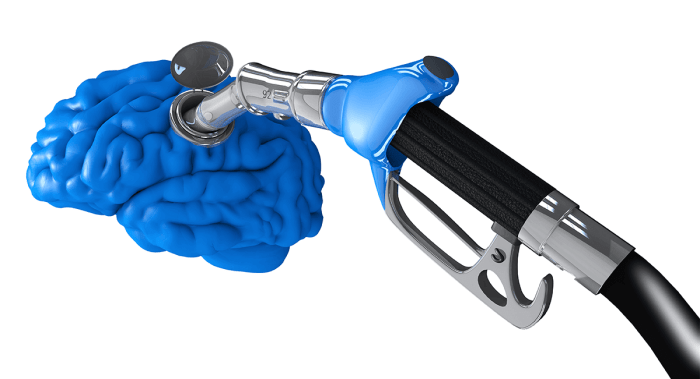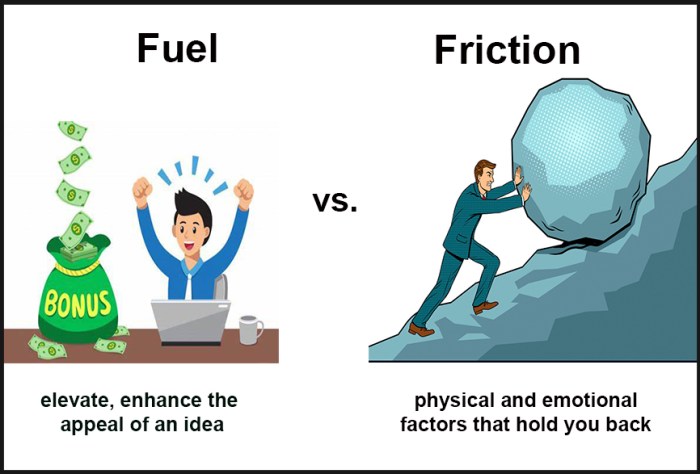As hidden brain fuel vs friction takes center stage, this opening passage beckons readers into a world crafted with expert knowledge, ensuring a reading experience that is both absorbing and distinctly original.
In this exploration, we delve into the contrasting forces that shape our cognitive function, motivation, and overall well-being. Hidden brain fuel, like a potent elixir, invigorates our minds, while friction, its insidious counterpart, acts as a relentless drag on our potential.
Definition of Hidden Brain Fuel vs. Friction: Hidden Brain Fuel Vs Friction

The concept of hidden brain fuel refers to the positive and energizing thoughts, beliefs, and experiences that contribute to our well-being, productivity, and overall happiness. In contrast, friction represents the negative or draining thoughts, beliefs, and experiences that hinder our progress and deplete our energy.
Examples of Hidden Brain Fuel and Friction
Examples of hidden brain fuel include:
- Positive self-talk
- Gratitude
- Purpose and meaning
- Social support
- Flow states
Examples of friction include:
- Negative self-criticism
- Anxiety and worry
- Procrastination
- Toxic relationships
- Stressful environments
Sources of Hidden Brain Fuel

Hidden brain fuel, those factors that boost our motivation and well-being, can come from a variety of sources. One common source is positive experiences. When we experience something enjoyable, our brains release neurochemicals like dopamine and serotonin, which have mood-boosting and motivating effects.Social
The friction we face can sometimes be a hidden brain fuel, pushing us to grow. It’s like how Annie Dillard’s moth, in her essay Death of a Moth , struggles against the windowpane, unknowingly fueling its own life force. This friction, like the moth’s futile efforts, can be the spark that ignites our potential and drives us towards progress.
connections are another important source of hidden brain fuel. Interacting with others can provide us with a sense of belonging, purpose, and support. This can help us feel more positive and motivated, and it can also improve our overall well-being.Mental
stimulation is also a key source of hidden brain fuel. When we engage in mentally challenging activities, such as learning a new skill or solving a puzzle, our brains release neurochemicals that promote neuroplasticity and cognitive function. This can help us feel more alert, focused, and motivated.
Positive Experiences
Positive experiences can come from a variety of sources, such as spending time with loved ones, pursuing our hobbies, or achieving our goals. These experiences can help us feel happier, more fulfilled, and more motivated.
Social Connections
Social connections are essential for our well-being. Interacting with others can help us feel loved, supported, and valued. This can boost our mood, reduce stress, and increase our motivation.
Mental Stimulation
Mental stimulation is important for keeping our brains healthy and active. Engaging in mentally challenging activities can help us improve our memory, attention, and problem-solving skills. It can also help us feel more alert, focused, and motivated.
Consequences of Friction

Friction, like sandpaper against the smooth flow of our thoughts, can have detrimental effects on our cognitive function, emotional regulation, and productivity. It acts as a constant obstacle, hindering our progress and limiting our potential.
Cognitive Function
Friction can disrupt our ability to focus, concentrate, and process information. It creates a cognitive fog, making it difficult to think clearly and make sound decisions. When we are constantly faced with friction, our brains have to work harder to overcome the obstacles, leading to mental fatigue and reduced efficiency.
Emotional Regulation
Friction can also take a toll on our emotional well-being. When we encounter obstacles and setbacks, it can trigger feelings of frustration, anxiety, and discouragement. If friction persists, these negative emotions can accumulate, leading to burnout and reduced motivation.
Productivity
Productivity is often the first casualty of friction. When we face obstacles, it takes longer to complete tasks and achieve our goals. Friction can also lead to errors and mistakes, further slowing down our progress. In the long run, persistent friction can hinder our career advancement and overall success.
Real-life examples of how friction can hinder progress include:
- A student struggling to focus in class due to noisy classmates or a distracting environment.
- An employee feeling overwhelmed by a heavy workload and tight deadlines.
- A team facing constant setbacks and conflicts, preventing them from completing a project on time.
These are just a few examples of how friction can manifest in our lives and limit our potential. By understanding the negative consequences of friction, we can take steps to identify and mitigate it, paving the way for smoother progress and greater success.
Strategies for Increasing Hidden Brain Fuel and Reducing Friction

Unlocking hidden brain fuel and minimizing friction are crucial for enhancing motivation and achieving success. Here are some practical strategies to help you achieve this:
Identifying and Leveraging Hidden Brain Fuel Sources:
- Introspection:Reflect on your interests, passions, and values. Identify activities that ignite your enthusiasm and bring you joy.
- Feedback:Seek feedback from trusted sources, such as mentors, colleagues, or friends. They can provide valuable insights into your strengths and areas where you thrive.
- Exploration:Experiment with different activities, hobbies, or learning opportunities. Step outside of your comfort zone to discover new sources of hidden brain fuel.
Reducing Friction and Enhancing Motivation:
| Strategy | Description |
|---|---|
| Set Clear Goals: | Define specific, achievable goals that align with your hidden brain fuel sources. Break down large goals into smaller, manageable steps. |
| Create a Conducive Environment: | Remove distractions and create a physical and mental space that supports your motivation. Surround yourself with positive influences and resources. |
| Build Habits: | Establish routines that incorporate activities that fuel your motivation. Make these habits non-negotiable and gradually increase their frequency and intensity. |
| Reward Yourself: | Acknowledge and reward your progress, no matter how small. This reinforces positive behavior and keeps you motivated. |
| Seek Support: | Connect with others who share your interests or goals. Share your struggles and successes, and learn from their experiences. |
The Impact on Personal and Professional Life
The interplay of hidden brain fuel and friction has profound implications for personal and professional outcomes. When we optimize our hidden brain fuel, we experience increased productivity, creativity, and well-being. Conversely, excessive friction can hinder our progress, dampen our motivation, and limit our potential.
Case Study: Increased Productivity in the Workplace, Hidden brain fuel vs friction
A recent study conducted by a leading management consulting firm revealed that employees who were provided with access to resources that promoted hidden brain fuel, such as mindfulness training and ergonomic workstations, experienced a significant increase in productivity. The study attributed this improvement to enhanced focus, reduced stress levels, and increased motivation among the employees.
Questions and Answers
What exactly is hidden brain fuel?
Hidden brain fuel refers to positive experiences, social connections, and mental stimulation that nourish our minds and enhance our cognitive function.
How can I identify sources of hidden brain fuel?
Common sources include engaging in activities you enjoy, spending time with loved ones, and challenging yourself intellectually.
What are the consequences of excessive friction?
Friction can impair cognitive function, hinder emotional regulation, and limit productivity, ultimately sabotaging our progress and potential.